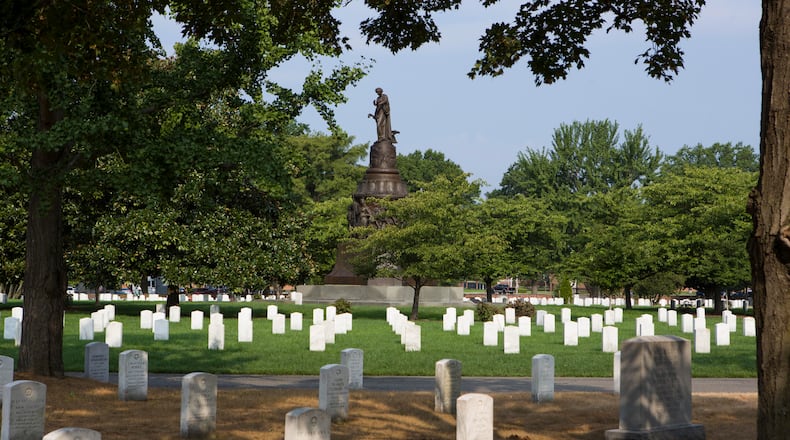As a 28-year Navy combat veteran, it pains me to see the fabric of our nation unraveling and the history of our country crumbling by the day. Many founding principles and symbols that make the United States the greatest country in the world have been demonized to sow discord for nefarious political gain.
After all, it is far easier to divide and conquer when the values, history and liberties that unite us are destroyed.
A powerful example of this deliberate division is the recent removal of the Reconciliation Monument from Arlington National Cemetery.
Credit: Photo contributed by the candidate
Credit: Photo contributed by the candidate
Following the Spanish-American War — where Union and Confederate veterans fought side-by-side under one flag — President William McKinley declared that the U.S. government would commit to properly burying Confederate soldiers. In 1898, McKinley passionately asserted, “Sectional feeling no longer holds back the love we feel for each other. The old flag waves over us in peace with new glories.”
In this spirit, Congress authorized Confederate remains to be buried at Arlington National Cemetery in 1900. Six years later, Secretary of War William Howard Taft permitted the construction of a memorial honoring our country’s new shared reconciliation from its troubled divisions. Finally, in 1914, President Woodrow Wilson unveiled the new memorial of national unity. Designed by a Jewish American sculptor, the monument is topped with a woman crowned by an olive wreath to symbolize peace.
Prior to the completion of the monument, President Theodore Roosevelt sent a floral arrangement to the Confederate section of Arlington National Cemetery. This established a tradition of sending a wreath to the Reconciliation Monument, a custom that has been carried out by nearly every U.S. president — including President Barack Obama.
Unfortunately, the now-disbanded Naming Commission, which was authorized by Congress through the National Defense Authorization Act for Fiscal Year 2021, recommended the removal of the Reconciliation Memorial. The Naming Commission was charged with recommending the removal of “all names, symbols, displays, monuments, and paraphernalia that honor or commemorate the Confederate States of America.”
However, the Reconciliation Monument does not honor nor commemorate the Confederacy; it honors and commemorates national unity. Additionally, the Naming Commission’s authority explicitly prohibited the desecration of grave sites. I simply cannot fathom how removing the monument built to recognize our country’s journey to reconciliation does not desecrate the hundreds of graves encircling the marker.
For these reasons, I led an amendment to the fiscal year 2024 Defense Appropriations bill to prohibit the Department of Defense from using funds to remove the Reconciliation Memorial. Notably, my amendment passed by voice on the House floor and was included in the House-passed Defense spending bill.
Regrettably, my amendment was stripped out during budget negotiations with the Senate, and the memorial was removed from Arlington National Cemetery.
In a renewed attempt to protect the memorial and bolster its intended purpose of national unity, I recently introduced an amendment to the fiscal year 2025 Military Construction, Veterans Affairs, and Related Agencies bill to return the Reconciliation Monument to Arlington National Cemetery.
My effort to preserve a structure representing the United States’ healing from a dark chapter in history drew outlandish but unsurprising ire. Specifically, my work to honor and safeguard this period of reconciliation led critic Jamie Dupree to label me as “the unofficial champion of the Confederacy on Capitol Hill.”
This is dishonest, disingenuous and patently false.
Mind you, support for the Reconciliation Monument is not partisan. Former Secretary of the Navy and former U.S. Sen. Jim Webb (D-Va.), a decorated Marine Corps officer who served combat tours in Vietnam, published an inspiring piece detailing his opposition to removing the memorial.
Is Webb also an “unofficial champion of the Confederacy”? No. He is a patriot who loves his country. Though we bear different political stripes, we share the same concern of erasing our nation’s history — especially our history of reconciliation from deep, divisive wounds.
National unity should not be controversial. As bad actors revel in tearing our country apart, it is up to patriotic Americans to stand firm in preserving our history, protecting our freedoms and promoting a more perfect union.
Rep. Andrew Clyde represents Georgia’s 9th Congressional District and serves on the House Appropriations Committee.
About the Author




